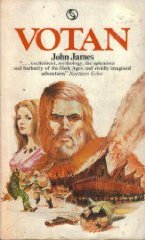John James only wrote three books that I’m aware of: Votan, Not For All the Gold in Ireland, and the much more serious novelization of the Goddodin, Men Went to Cattraeth. They were all published as mainstream in the late sixties and republished as fantasy in the late eighties, and as far as I can see, nobody bought them. I don’t think they’ve ever had US publication. They’re historical novels with a tiny touch of the fantastic, but what makes them interesting is that they’re historical novels that purport to explain the origin stories for mythology—in Votan, the whole adventures of Odin from the various sagas, and in Not For All the Gold in Ireland, half of the Mabinogion and the Tain. They’re the kind of thing where the more you know about the mythology the funnier and cleverer they are, so of course I like Not For All the Gold in Ireland more, because Celtic myth is one of my specialist subjects.
Votan begins:
Well, if you really want to know how it was I came to be chained to an oak tree, half way up in the middle of nowhere, with wolves trying to eat me out of it, I’ll tell you. Of course, it’s not nearly as interesting as what happened afterwards, but you can piece that together yourself if you go down to any of the taverns around the Praetorian barracks and listen to that the soldiers sing. If you can understand German, of course.
The idea is that Photinus, a smartass Greek-speaking Roman in the first century AD, went out of the empire and got into complicated trouble, mostly caused by women, in which the exploits of Odin make sense, or almost sense, and Photinus comes to be worshipped as a god while continuing himself to worship Apollo. In Not For All the Gold in Ireland he goes to Britain and Ireland in AD 70 and while trying to get back a contract takes on the role of Manannan. Then he goes to Ireland, where there isn’t any gold, just as the Romans are about to conquer it, except that of course they don’t, and runs into the characters and events of the Tain. The book has one of those endings where everything goes down like dominoes.
I don’t normally like books that are intended to be funny. They don’t often match my sense of humour and I tend to get irritated by them. (I do not, for instance, like the Discworld books.) These are no exception, there are things in them that irritate me. But they’re so cleverly put together, and they know their material so very well that I’ll forgive them the occasional tedious joke about how the girls of Lutetia Parisii know nothing about fashion. Mostly the history, both inside and outside the classical world, is accurate to what was known as of when they were written, and while the idea of one Roman setting off so much mayhem is inherently ridiculous, it’s also charming, and not entirely intended seriously.
These are just the thing to keep your spirits up if you’re feeling a little under the weather.










